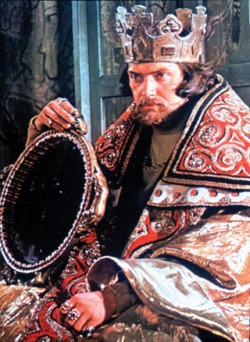Macbeth

Macbeth, the protagonist of the story, is an eleventh century Scottish Thane who is both skilled on the battlefield and extremely courageous. At least, that is our first impression. However, as the story continues, we find out that Macbeth is, in fact, over-ambitious and easily manipulated. These flaws lead to his tragic downfall.
Macbeth is a dynamic character who is easily influenced by manipulation. We first meet Macbeth immediately after his impressive fighting performance in the battle against a rebellious thane. At first he seems innocent, loyal and trustworthy - he is taken aback when three witches predict that he will one day be King, as he had no such ambition. When he reports this prediction to his wife, Lady Macbeth, she manipulates him into killing King Duncan so he will be in line to take the throne. However, after Duncan is killed, Macbeth begins to feel more willing to murder and he takes the reins. He becomes a terrible King consumed with a combination of paranoia and guilt. He kills his friend Banquo because of a prophecy, and he kills the wife and children of Macduff, a Scottish noble, for no apparent reason. By the end of the play, he is a tyrant concerned exclusively with the preservation of his rule with a guilty conscience that prevents him from enjoying it.
Macbeth’s ambition also plays an important role in his downfall. When Lady Macbeth proposed the idea of murdering Duncan there were three major forces at work in Macbeth’s decision making process: his moral code, Lady Macbeth’s manipulation, and his ambition to acquire power. Manipulation and ambition won out. After this point, Macbeth completely disregards any moral code and his ambition takes over. His will to protect the throne causes him to commit a series of unnecessary murders that only aggravate the situation. The two nobles, Macduff and Lenox, conspire against him and lead an army of English soldiers to place Duncan’s son, Malcolm, on the throne. Because Macbeth has proven unable to rule as a King in court, he must once again become a warrior on the battlefield.
With the English army approaching, Macbeth returns to his role as a warrior. The play ends with him dying at the sword of Macduff.
Connor Quinn
Macbeth is a dynamic character who is easily influenced by manipulation. We first meet Macbeth immediately after his impressive fighting performance in the battle against a rebellious thane. At first he seems innocent, loyal and trustworthy - he is taken aback when three witches predict that he will one day be King, as he had no such ambition. When he reports this prediction to his wife, Lady Macbeth, she manipulates him into killing King Duncan so he will be in line to take the throne. However, after Duncan is killed, Macbeth begins to feel more willing to murder and he takes the reins. He becomes a terrible King consumed with a combination of paranoia and guilt. He kills his friend Banquo because of a prophecy, and he kills the wife and children of Macduff, a Scottish noble, for no apparent reason. By the end of the play, he is a tyrant concerned exclusively with the preservation of his rule with a guilty conscience that prevents him from enjoying it.
Macbeth’s ambition also plays an important role in his downfall. When Lady Macbeth proposed the idea of murdering Duncan there were three major forces at work in Macbeth’s decision making process: his moral code, Lady Macbeth’s manipulation, and his ambition to acquire power. Manipulation and ambition won out. After this point, Macbeth completely disregards any moral code and his ambition takes over. His will to protect the throne causes him to commit a series of unnecessary murders that only aggravate the situation. The two nobles, Macduff and Lenox, conspire against him and lead an army of English soldiers to place Duncan’s son, Malcolm, on the throne. Because Macbeth has proven unable to rule as a King in court, he must once again become a warrior on the battlefield.
With the English army approaching, Macbeth returns to his role as a warrior. The play ends with him dying at the sword of Macduff.
Connor Quinn
